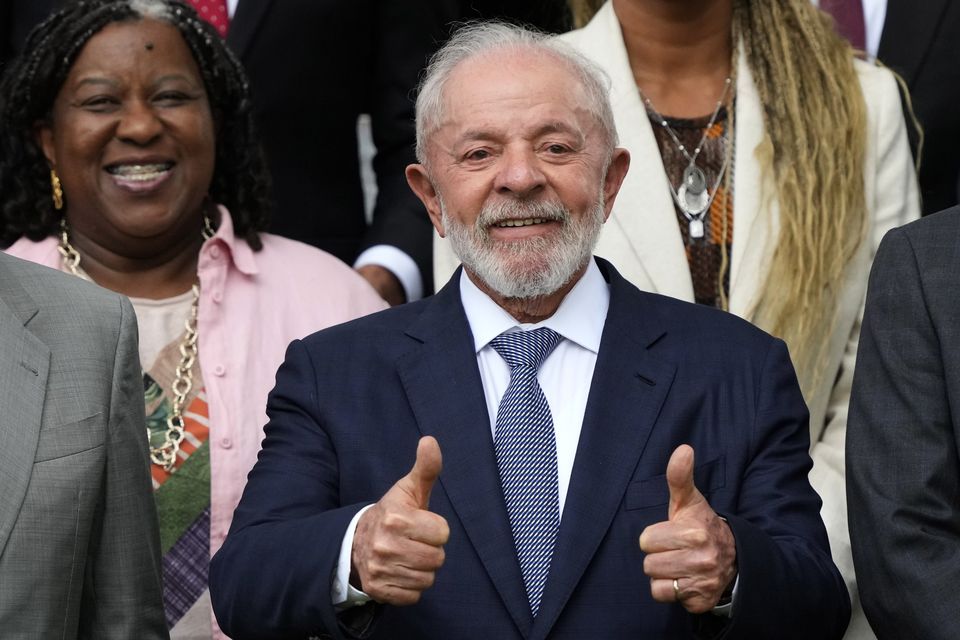Brazil’s prosecutor-general on Tuesday formally charged former president Jair Bolsonaro with attempting a coup to stay in office after his 2022 election defeat, in a plot that included a plan to poison his successor and current president Luiz Inacio Lula da Silva and kill a Supreme Court judge.
Prosecutor-general Paulo Gonet alleges that Mr Bolsonaro and 33 others participated in a plan to remain in power. The alleged plot, he wrote, included a plan to poison Mr Lula and shoot dead Supreme Court justice Alexandre de Moraes, a foe of the former president.
“The members of the criminal organization structured a plan at the presidential palace to attack institutions, aiming to bring down the system of the powers and the democratic order, which received the sinister name of ‘Green and Yellow Dagger,’” Mr Gonet wrote in a 272-page indictment.
“The plan was conceived and taken to the knowledge of the president, and he agreed to it.”
Mr Bolsonaro is often seen in Brazil’s yellow-and-green national soccer jersey and the colours have become associated with his political movement.
Mr Bolsonaro’s defence team said it met the accusations with “dismay and indignation”, adding in a statement that the former “President has never agreed to any movement aimed at deconstructing the democratic rule of law or the institutions that underpin it”.
Mr Bolsonaro’s son, Flavio Bolsonaro, who is a senator, said on the social platform X that the indictment was “empty” and there was no evidence of wrongdoing. He accused the Prosecutor-General’s Office of serving “the nefarious interests of Lula”.
In November, Brazil’s Federal Police filed a 884-page report with Mr Gonet detailing the scheme.
They allege a systematic effort to sow distrust in the electoral system, drafting a decree to provide legal cover for the plot, pressuring top military brass to go along with the plan and inciting a riot in the capital.
In the indictment, Mr Gonet described the alleged crimes as part of a chain of events articulated with an overarching objective of stopping Mr Bolsonaro from leaving office, “contrary to the result of the popular will at the polls”.
The Supreme Court will analyse the charges and, if accepted, Mr Bolsonaro will stand trial.
The far-right leader denies wrongdoing. “I have no concerns about the accusations, zero,” Mr Bolsonaro told journalists earlier on Tuesday during a visit to the Senate in Brasilia.
“Have you seen the coup decree, by any chance? You haven’t. Neither have I,” he added.
Fabio Wajngarten, a lawyer for Mr Bolsonaro, did not immediately comment on the charges but said there will be a statement without saying when.
As well as participating in a coup d’etat, the 34 defendants are accused of participating in an armed criminal organisation, attempted violent abolition of the democratic rule of law, damage qualified by violence and serious threat against the state’s assets, and deterioration of listed heritage, according to a statement from the Prosecutor General’s press office.
Mr Gonet said the criminal organisation he charged “had as leaders the (then) president himself and his running mate, Gen. Braga Netto”.
“Both accepted, stimulated, and performed acts that are described in our criminal legislation as attacking the existence and the Independence of (the branches) of power and of the democratic rule,” Mr Gonet wrote in his report.
Brazil’s President Luiz Inacio Lula da Silva (AP Photo/Eraldo Peres)
The indictments, based on manuscripts, digital files, spreadsheets, and message exchanges, expose a scheme to disrupt democratic order, according to the prosecutor-general’s office.
The charges are “historic”, said Luis Henrique Machado, a criminal attorney and professor at the IDP university in Brasilia, adding that he expects the Supreme Court to accept the charges and put Bolsonaro on trial sometime before the end of next year.
“The charges show Brazil’s institutions are robust, independent and agile,” Mr Machado said. “They are a role model for other countries where democracy is at risk.”
Bolsonaro is barred from running in the 2026 election after judges with the country’s top electoral court ruled that he abused his power and cast unfounded doubts on the country’s electronic voting system.
Following Tuesday’s charges, Mr Bolsonaro will “position himself as a victim”, said Carlos Melo, a political science professor at Insper University in Sao Paulo. Mr Bolsonaro has previously said his legal woes are an attempt to stop him from returning to office.
“There are polls saying he would be competitive in the 2026 elections against Lula, one of them published today,” said Mr Melo.
“There’s going to be political dust, but it will settle.”
